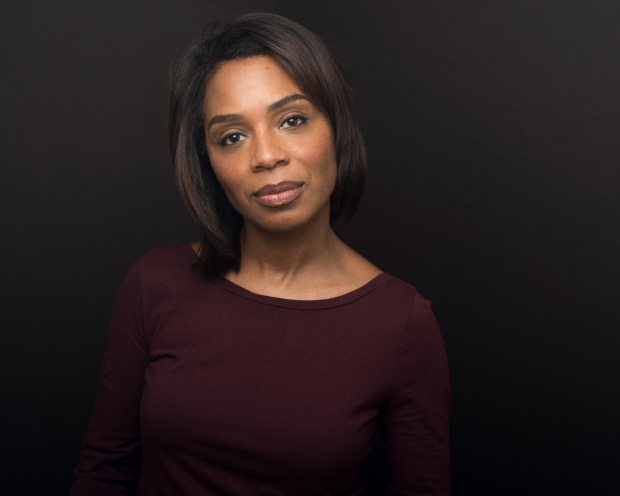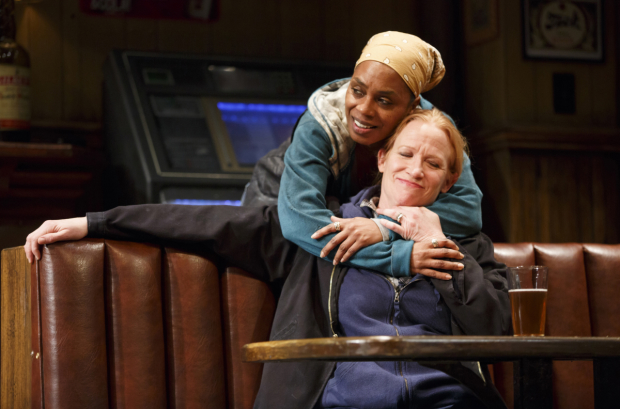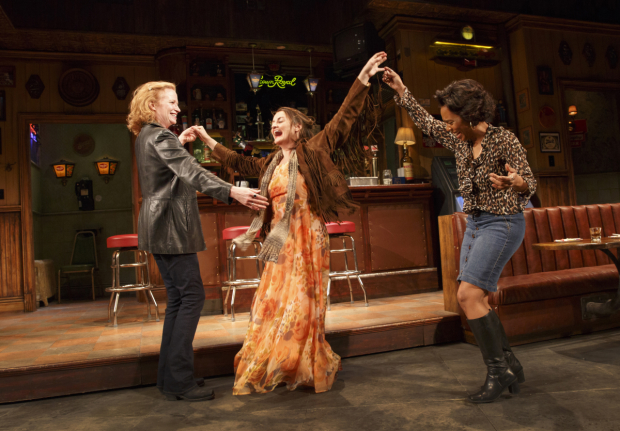Sweat Tony Nominee Michelle Wilson: Saying What Needs to Be Said on Broadway

(© Luke Fontana)
Broadway's Sweat, this year's Pulitzer Prize winner for drama, is also nominated for three Tony Awards, with one nod for Best Play and two for Best Performance by an Actress in a Featured Role in a Play. One of the show's two performance honors goes to Michelle Wilson (the other is for Johanna Day), who is recognized for playing longtime factory worker Cynthia. Having originated the role during Sweat's recent off-Broadway run at the Public Theater, which also featured most of the Broadway production's ensemble, Wilson is spending her season as a Tony nominee reflecting on the journey — and collaborators — that brought her here.
During a break in her schedule, Wilson took the opportunity to discuss what makes the experience of performing Lynn Nottage's play about race, class, and the American dream on Broadway so important in this moment, saying, "To be able to bring this piece into the larger consciousness at this period of time feels like, this is the entire purpose of art."

(© Joan Marcus)
Tell me about your first encounter with the play.
I was actually in Detroit working on Dominique Morisseau's Detroit '67, and I remember reading Sweat — knowing that it was powerful but I was so in the middle of another project, I couldn't quite make the ideas marry. You know, I'm having this really powerful experience and couldn't really process something else that's very powerful. But I remember not being able to put the script down, so I've got a whole play in my head and I'm in tech and I could not put Sweat down. I couldn't stop thinking about it. That was my first introduction to it. It haunted me.
So I went from Detroit, and then I graduated my daughter from high school, and got her into her first semester at Smith on a neuroscience scholarship, and I started rehearsals for Sweat.
What has it meant to you to do these two pieces back-to-back?
The thing about art is I feel like roles find me. As a single mother, there's times I've had to step away from the art to provide and to hustle, but really important things, things that feel like they need to be said, seem like they find their way to me. And it's just an honor. It's an honor to work on art, particularly with women of color.
I'm a little spoiled now, because there's something about the way women communicate. There is a directness and a ruthlessness to it that is really fascinating to me — you know, men kind of have the luxury of tiptoeing around things. And [women] have to deal with sexism and all of those other dynamics so that maybe at this level they can't afford to appear vague or unempowered. And [director Kate Whoriskey] really trusted us because she said, "You're going to do this entire process, previews included, and we won't be done and it's OK. And I know we're not done." And that's exactly how it worked out. We were still just grinding to get this under our feet and into our bodies until the very last moment.
What has it been like to move this piece from the Public Theater to Broadway?
On just a technical level, it's so rare that you get to work on a piece, shut it down for a month or so, and know you're coming back to it and get to rehearse again. That was really powerful, particularly for such a dense piece. But on a creative side, to have these high-level, empathetic, nonpathological, nonbinary conversations with ourselves and society, this is why we do it.
Do you feel like you have been getting to have those conversations?
Totally and completely. When we were doing the show at the Public, one of the really powerful times we did it, it was a student matinee and the babies were so expressive and at one point during the fight they're yelling, "No! No!" They're just so hurt, you know? You fall in love with these people and you're tracking them and you care so much about them. And I have the feeling that this is translating into the larger community, the larger society — because [audiences] can't stop thinking about this, they can't stop talking about it.
What is it like to be part of this ensemble?
Can I tell you that this is one of the most joyful casts I've ever been a part of? And we're so protective of each other. It so hurts that the Tonys doesn't have an ensemble award. What everybody is doing up there, none of us could do it without the other. That's how the piece is written. I've never seen such a solid ensemblely written piece where everybody has an aria. It really is beautiful. There's nothing but joy. Anytime of the day you're going to come into the theater and one of my cast members will be there. We love being at work. We love being with each other. There's nothing but laughs and foolishness. And then we go out there every night and just sacrifice ourselves for something larger.
I know I speak for everyone in the ensemble when I say that we've always known that this is something larger than us, and I think we're honored that it appears that people are getting it, that they're receiving it.

(© Joan Marcus)











